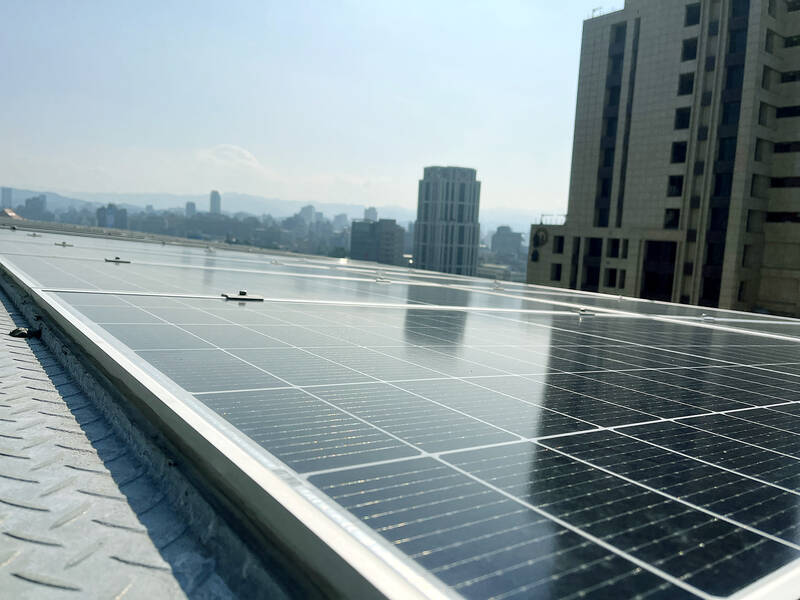The government aims to have solar energy panels installed on at least 1,000 rooftops across Taiwan in a “citizen participation” plan as part of efforts to achieve net zero carbon emissions by 2050, the Environmental Protection Administration (EPA) said yesterday.
“We are experiencing the hottest November in Taiwan’s climatic history, showing that no country is spared from the influence of climate change,” EPA Deputy Minister Shen Chih-hsiu (沈志修) told a news conference in Taipei.
In March, Taiwan announced 12 key strategies to achieve net zero carbon emissions by 2025, with the development of solar energy one of them, Shen said.

Photo: Chen Chia-yi, Taipei Times
“Taiwan consumes a lot of energy. To achieve net zero carbon emission, we need to conserve energy and produce green energy,” he said. “Solar panels that are installed on rooftops not only generate electricity, but they help keep the structures beneath them cool in summer.”
To set an example, the EPA participated in a program launched by the Energy Bureau in which agencies of the central government would lease rooftops to solar energy operators, Shen said.
However, no commercial operators were interested in installing solar panels on top of the EPA building, deeming it too small and shaded, he said.
“We looked at how community renewable energy projects proceed in other countries and determined that solar panels should be installed on rooftops of at least 132.2m2 that have at least two hours of direct sunlight per day,” Shen said. “In March, we leased the rooftop to the Green Advocates Energy Cooperative to install solar panels, which began generating power in September.”
The EPA building has a rooftop area of about 363m2, on which 357 panels are installed, the agency said.
Collectively, the panels produce about 148 megawatt-hours per year, or about 14 percent of the electricity the EPA uses annually, it said, adding that the new infrastructure would cut carbon dioxide emissions by 74.3 tonnes.
By leasing its rooftop for the panels, the EPA is eligible for a rebate of NT$75,800 per year, it said.
EPA Climate Change Office Director Tsai Ling-yi (蔡玲儀) said that it aims to have solar panels installed on 1,000 more rooftops among 1,222 low-carbon communities certified by the EPA, including residential buildings, community centers and temples.
Individuals or organizations that permit their rooftops to be used for solar installations do not need to pay for the facilities and would be eligible for rebates from Taiwan Power Co, Tsai said.
“We will make green-energy-generating rooftops a requirement to be certified as a low-carbon community,” she said.

Palauan President Surangel Whipps Jr arrived in Taiwan last night to kick off his first visit to the country since beginning his second term earlier this year. After arriving at Taoyuan International Airport at around 6:30 pm, Whipps and his delegation were welcomed by Minister of Foreign Affairs Lin Chia-lung (林佳龍). Speaking to gathered media, the Palauan leader said he was excited and honored to be back in Taiwan on his first state visit to Taiwan since he was sworn in this January. Among those traveling with Whipps is Minister of State Gustav N. Aitaro, Public Infrastructure

President William Lai (賴清德) yesterday thanked Palau for its continued support of Taiwan's international participation, as Taipei was once again excluded from the World Health Assembly (WHA) currently taking place in Switzerland. "Palau has never stopped voicing support for Taiwan" in the UN General Assembly, the WHO and other UN-affiliated agencies, Lai said during a bilateral meeting with visiting Palau President Surangel Whipps Jr. "We have been profoundly touched by these endorsements," Lai said, praising the Pacific island nation's firm support as "courageous." Lai's remarks came as Taiwan was excluded for the ninth consecutive year from the WHA, which is being held in

RESOLUTIONS DEBATE: Taiwan’s allies said that UN and WHA resolutions cited by China and other nations ‘do not determine Taiwan’s participation in WHO activities’ A proposal to invite Taiwan to this year’s World Health Assembly (WHA) was rejected on Monday, resulting in Taipei’s absence from the annual meeting for a ninth consecutive year, although partners spoke up for Taiwan’s participation at the first day of the meeting. The first agenda item after the opening was a “two-on-two debate” on a proposal to invite Taiwan to participate at the WHA as an observer. Similar to previous years, two countries made statements in favor of the proposal, while two others expressed their opposition. Philippine Secretary of Health Teodoro Herbosa, president of the 78th WHA, accepted the WHA General Committee’s

At least three people died and more than a dozen were injured yesterday afternoon when a vehicle struck a group of pedestrians in New Taipei City’s Sansia District (三峽). The incident happened at about 4pm when a car rammed into pedestrians at an intersection near Bei Da Elementary School. Witnesses said the sedan, being driven at a high speed, ran a red light, knocking scooters out of the way and hitting students crossing the road before careening into a median near the intersection of Guocheng and Guoguang streets. The incident resulted in three deaths and 13 injuries, including the driver, a 78-year-old man